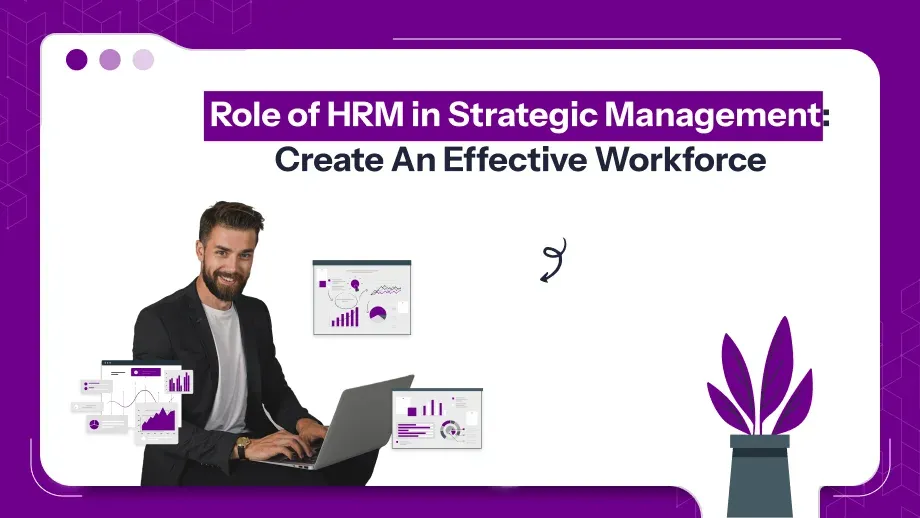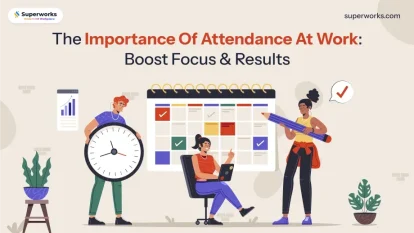
The role of HRM in strategic management is vital in determining the best way to align the employees of a company to its long-term objectives. In the present highly competitive business environment, companies manage their employees and initiatives using the strategic use of human resource management system. This article outlines the crucial contribution HRM can make to strategic management and, consequently how companies can take great advantage of these methods to develop a highly efficient and well-motivated workforce.
Understanding the Role of Strategic Management in HR
The role of HRM in strategic management involves creating organizational goals, formulating strategies to accomplish them, and coordinating resources to execute the plans. The role of strategic management in HR will be to make sure that the employees are properly trained, motivated, and aligned with the business’s strategy. HRM plays a role in two ways to play a dual role in the following process
- Strategic partner in organizational planning.
- People-centric strategies that enhance productivity and retention.
What Is the Role of HRM in Strategic Management?
The role of HRM in strategic management which is an organizational tool, is vital to ensure that the workforce of an organization is in line with its long-term objectives. It’s therefore not just an administrative job, but an essential partner in linking the management of talent and workforce planning to goals of the organization. Here are some additional ways in which HRM assists strategic management:
Aligning Workforce with Strategic Goals
HRM provides employees with an understanding of how they are part of the overall organizational goal. The role of HRM in strategic management align the objectives of the individuals and teams to the organization’s business strategy.
Driving Organizational Change
The other role of HRM in strategic management plays in strategic management is change management. Whether the company is implementing new technology, restructuring, or entering new markets, HRM helps organizations through employee preparation, resistance management, and building responsiveness.
Workforce Planning and Talent Management
HRM has allowed for future workforce planning by strategic workforce planning. The organization is assured of having the right people at the right time by identifying skill gaps and predicting talent requirements.
Talent acquisition and retention strategies are integral components of competitive types of human resource management strategies that allow businesses to attract and retain top talent.
Promoting a Performance-Driven Culture
HRM institutes performance management systems that monitor the contributions of employees and align them with strategic goals. Tools such as performance appraisals and feedback mechanisms help inculcate accountability and continuous improvement.
Training and Development
Training and development are at the core of HRM’s strategic function. Training employees to prepare them for future challenges will help the firm stay ahead.
Enhancing Employee Engagement
HRM develops strategies to help raise the employee engagement. By having training schemes, recognition schemes, and wellness schemes, HRM promotes higher workforce morale so that employees have a high motivation to contribute to organizational success.
Supporting Diversity and Inclusion
Diversities and inclusion- A diversified workplace is a competitive advantage. HRM promotes diversity as it facilitates positive hiring, the feeling of belonging among employees, and equal treatment accorded to employees.
Facilitating Succession Planning
HRM identifies and prepares future leaders through strategic succession planning. Preparing employees for leadership positions allows HRM to ensure business continuity and minimize the effects of turnover in key positions.
Key Contributions of HRM to Strategic Management
Workforce Planning
HRM anticipates future talent needs and creates strategies to meet that demand. That includes identifying areas of skill gap and creating a talent pipeline that will ensure business continuity.
Talent Acquisition and Retention
The role of HRM in strategic management focuses on getting the best available talent and building a work environment conducive to long-term commitment. The competitive compensation package, career opportunities, and recognition programs all serve this purpose.
Training and Development
Upskilling employees is a significant priority under strategic management. HRM equips employees with the knowledge and tools required to meet future challenges.
Promoting Organizational Culture
HRM fosters a positive organizational culture that is aligned with the company’s mission and values, which directly impacts employee engagement and performance.
Types of Human Resource Management Strategies
There are various forms of human resource management strategies that organizations use, such as:
- Talent Management Strategy: Attract, develop, and retain skilled employees.
- Operational HR Strategy: Efficiency in HR operations such as payroll and compliance.
- Transformational HR Strategy: Aligns HR practices with innovation and organizational change.
- Employee Engagement Strategy: Centers on boosting morale and creating a supportive work environment.
Importance of Strategic HRM
The role of HRM in strategic management is important because it develops a motivated workforce that contributes to business success. Here’s why it matters:
- Boosts Employee Productivity
The individual role will be aligned with the organizational goal, so employees will understand how their actions affect the success of the company.
- Enhances Employee Engagement
Strategic HRM focuses on creating a culture of recognition and belonging, which improves job satisfaction.
- Improves Adaptability
HRM strategies will enable organizations to respond to market changes and industry trends promptly.
Role of HR Technology in Strategic Management
Technology is important for HRM to contribute towards strategic management effectively. HRMS solutions streamline complex tasks and free up time for strategic planning.
Streamlining Processes
The cloud-based HRMS solutions automate payroll, attendance tracking, and compliance management in the HR departments.
Data-Driven Decision Making
HRMS solutions provide insights into workforce performance and engagement, supporting data-driven decisions to achieve organizational goals.
Enhancing Employee Experience
Self-service portals in HRMS & payroll systems allow the employees to have control over their data and resources, thereby enhancing satisfaction.
Challenges of HRM in Strategic Management
Although the role of HRM in strategic management is very important, it also carries a set of challenges that may hinder its effectiveness. These challenges often arise from the complexities of aligning human capital with organizational goals. Some of the common challenges that face HR professionals in strategic management and how to overcome them are outlined below.
Resistance to Change
Employees, like leaders, sometimes resist change to the organization – for instance, in adopting new technology, re-designing, or innovation processes – this creates barriers to the development of an adaptive workforce towards the attainment of strategic intent.
Solution: HRM must act as a mediator, using clear communication and training programs to reduce resistance and promote adaptability.
Limited Resources
Small businesses or startups do not have the resources to implement effective HR strategies. Budget constraints limit investments in HR technology, training, or incentives, thereby reducing the role of HRM in strategic management.
Solution: Use cost-effective tools such as HRMS solutions for small business and prioritize high-impact HR strategies to optimize resource allocation.
Aligning HR Strategies with Business Objectives
One major challenge is ensuring that HR strategies align seamlessly with the broader organizational goals. A disconnect can lead to wasted resources and misdirected efforts.
Solution: Involve HR leaders in strategic planning from the outset to align HRM practices with business priorities.
Rapid Technological Advancements
HRM has to keep pace with the technological advancement. The inability to implement the latest tools such as cloud HRMS solution can lead to inefficiency and missed opportunities for strategic alignment.
Solution: Update HR technology regularly and invest in scalable tools such as HRMS & payroll systems to stay competitive.
Managing Workforce Diversity
A diverse workforce brings unique perspectives but also creates challenges in terms of managing cultural differences, communication, and inclusivity.
Solution: Under the organization’s strategic management and HRM efforts, develop diversity and inclusion programs to create a sense of belonging through training and workshops.
Adapting to Market Changes
Frequent market fluctuations, economic changes, and industry trends require HRM to quickly adapt and recalibrate strategies. This agility can be difficult to achieve without proper tools and planning.
Solution: Use HRMS tools derived from real-time data and workforce analytics in response to current and forecasted changes in the market.
Measuring HR’s Strategic Impact
The role of HRM in strategic management cannot be easily proved in the absence of proper metrics or tools. It usually becomes a cost center instead of a strategic partner.
Solution: Utilize HR analytics and reporting tools of HRMS software in India to measure the contribution of HRM to the success of an organization.
Managing Employee Expectations
Employees today expect much more from the organizations they work for, which includes career development, work-life balance, and competitive benefits. Failure to achieve these expectations is a recipe for disengagement.
Solution: Develop employee-centric strategies that include flexible work arrangements, robust training programs, and wellness initiatives.
Steps to Enhance HRM’s Role in Strategic Management
Align HR Goals with Business Objectives
Ensure HR practices directly support the company’s strategic goals by mapping recruitment, training, and performance management to broader business needs.
Leverage HR Technology
HRMS solutions, for instance, can automate recurring tasks, allow tracking of the performance of your workforce, and make data-driven decisions to hone HR strategies.
Employee Development
Invest in employee training programs and career growth opportunities to upskill the employees, equipping them for future business challenges.
Collaborative Culture
Encourage teamwork and align individual contributions toward organizational goals so that the whole workforce is on the same strategic page.
Measure and Adjust HR Strategies
Regularly measure and assess HR initiative impact by reviewing feedback on effectiveness and areas needing improvement for more strategic efforts with a purpose.
Conclusion
Beyond routine HR functions, The role of HRM in strategic management by aligning HR practices with organizational goals toward an effective and motivated workforce. Leverage tools such as HRMS payroll software in india to ensure smooth HR operations with accurate payroll management and compliance while the HR teams can be engaged in strategic initiatives. A business that realizes the significance of strategic HRM is more likely to attain sustainable growth and success.









